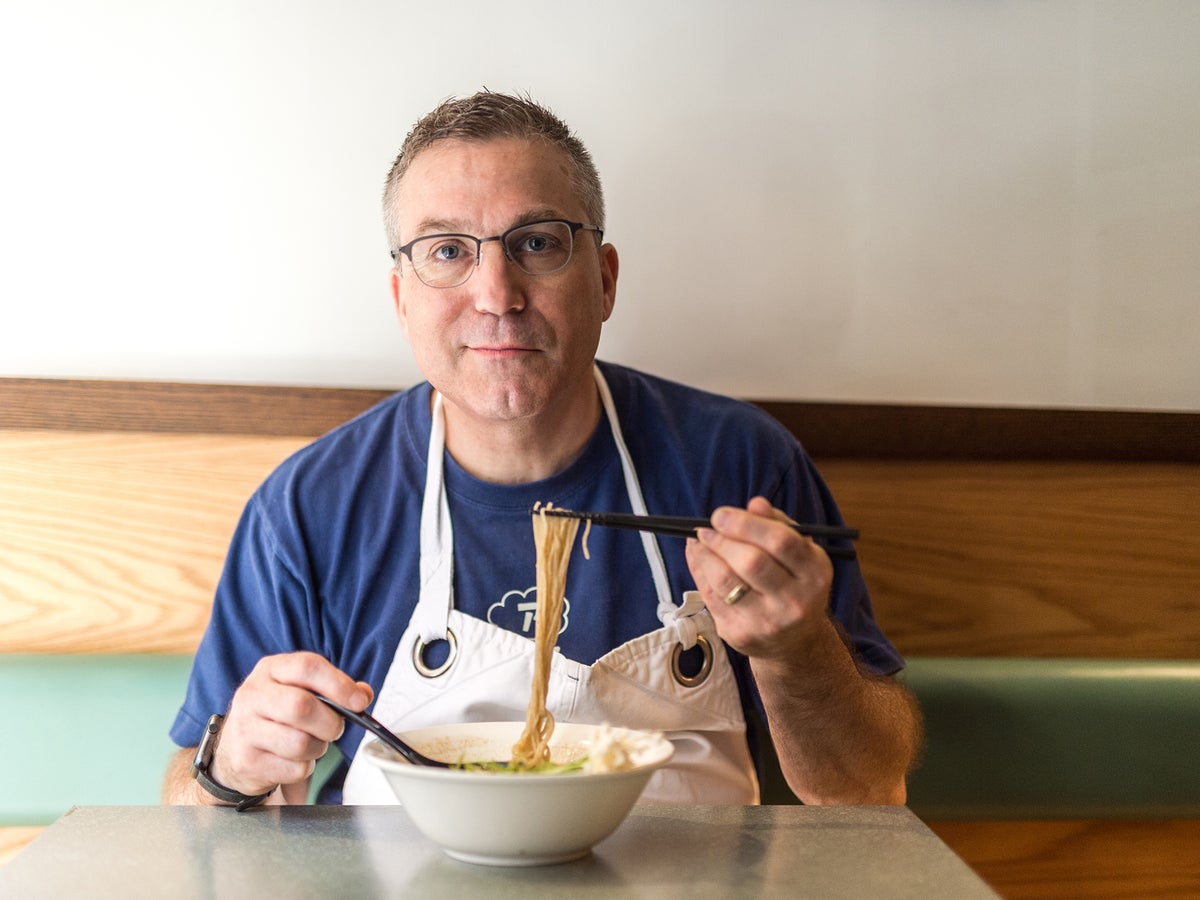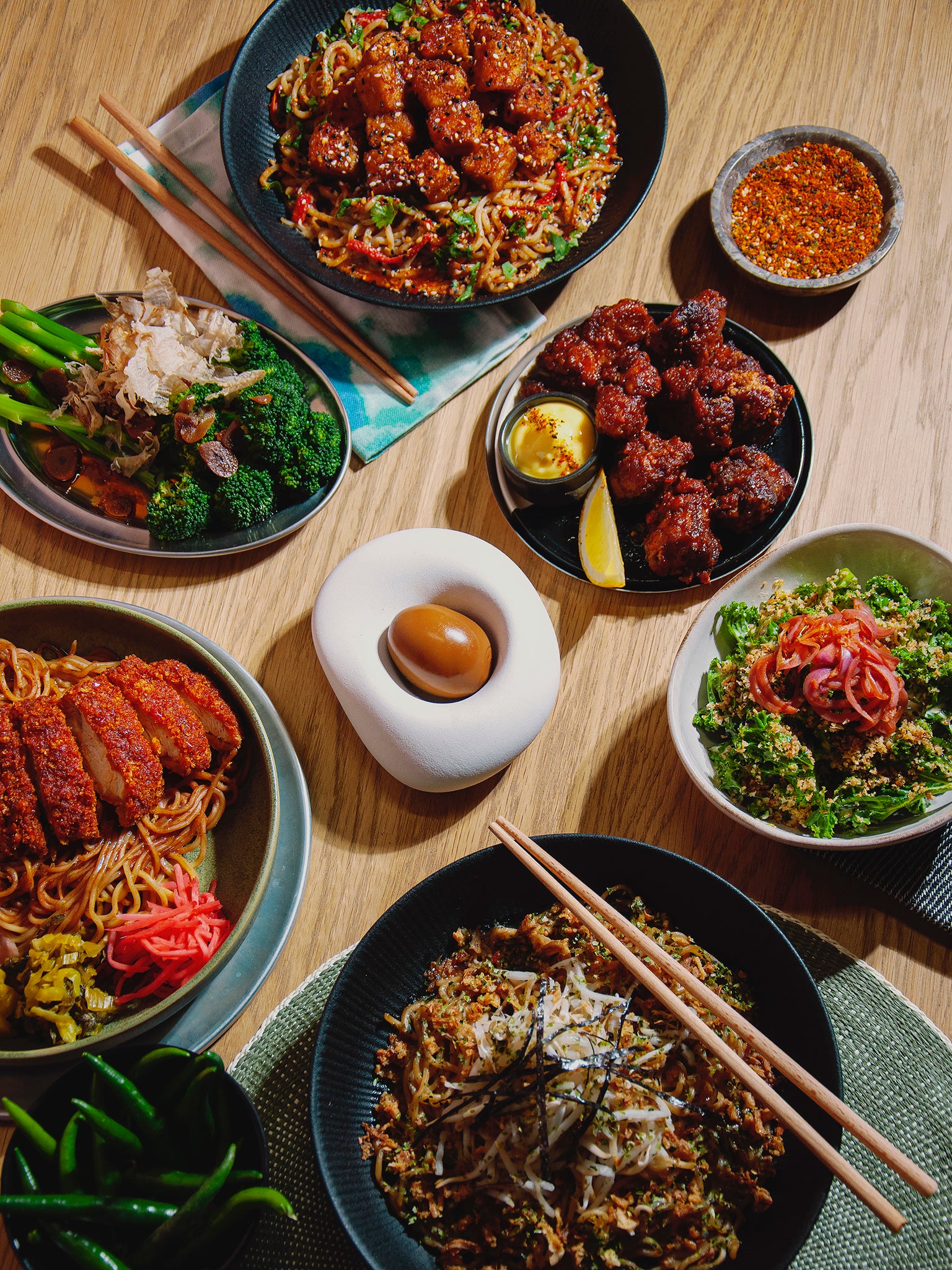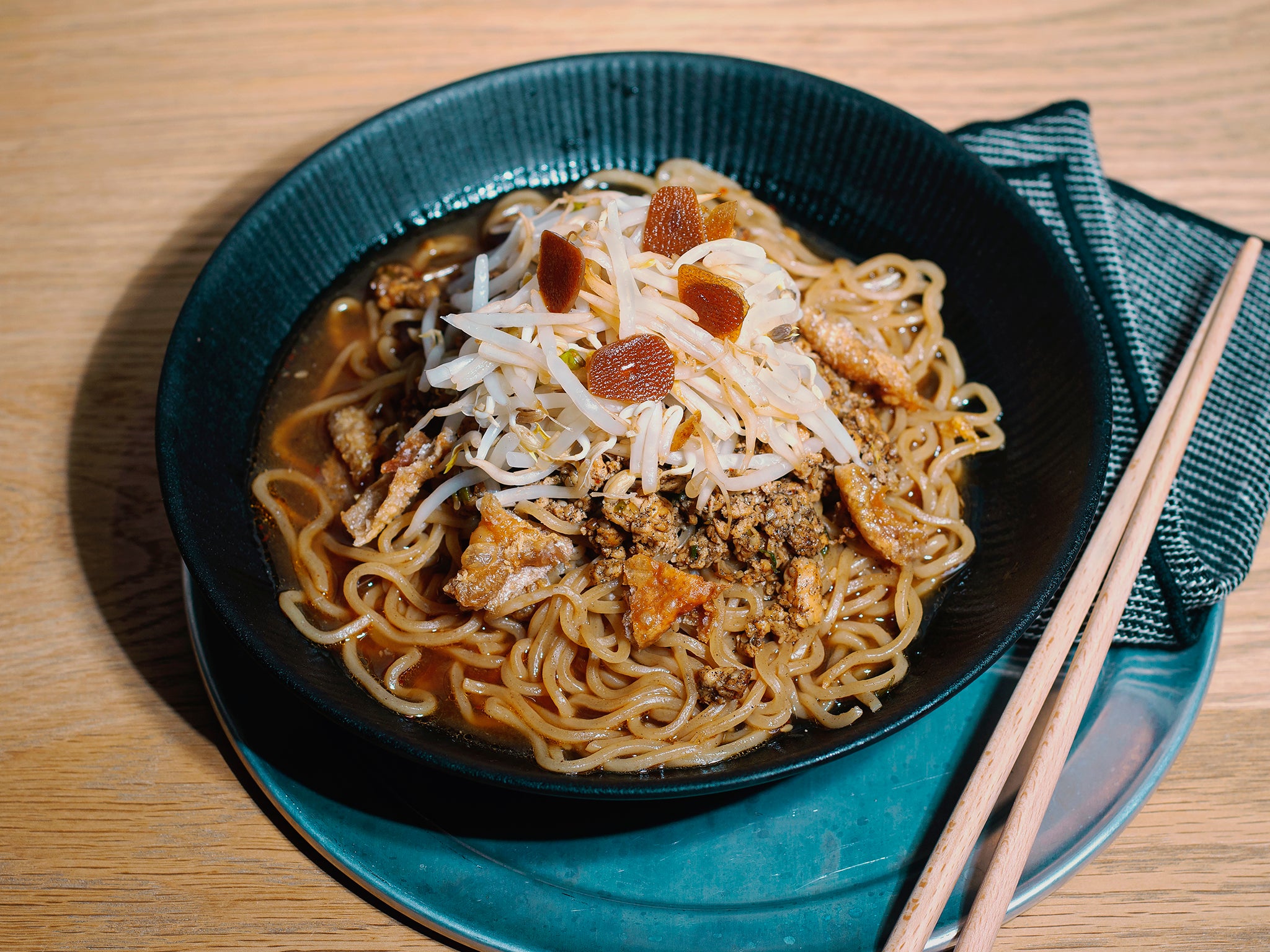
Ivan Orkin, the self-confessed “ramen junkie” on Instagram, has made his UK debut and he couldn’t be more excited. But there’s a twist – he isn’t serving ramen.
Instead, the British audience get to try his mazemen, a soupless noodle dish that the cook (he refuses to be called a chef) hopes will get delivered all over London and Brighton.
Working with Sessions, a “record label for food” that sets up food residencies in multiple locations throughout the UK, Orkin is testing British waters. His pop-up, Ivan Mazemen, is a riff on his renowned New York City restaurants, Ivan Ramen, and is running at Neighbourhood in Islington until 26 March.
Fans of the popular Netflix series Chef’s Table will remember Orkin from his episode on the show in 2016, where his story of how he became the American authority on ramen unfolded.
Orkin spent years in Japan, where he used to live, learning how to make ramen and gradually creating his own recipe. When he opened his first ramen shop there, visitors were surprised to walk in and find a white Jewish man from New York City running the operation. But his noodles quickly gained cult status and from there, Orkin built his business from the ground up.
Despite becoming known on the world stage, Orkin still describes himself as a “small business owner”. Bringing his food to the UK marks the fulfilment of a dream for him and the beginning of rather booming business.
I sat down with Orkin to talk about his love for British food, the art of ramen and why the way the West deals with death is “ludicrous”.
Has your UK debut been a long time coming? What made you want to start your own thing here?
When I was a kid in high school, in college, I was always interested in England and Europe, but I never really got a chance to get here. I ended up becoming very interested in Japan and moved there. I was never really wealthy enough to just travel anywhere in the world. So this has been a long time coming.
It’s almost embarrassing to act as though you’re surprised that London is good, I mean it’s London! It’s been a great city forever. But we’re really enjoying everything about it. We’ve been going to great cocktail bars, great restaurants. Everyone is really polite here, even if they don’t like you, they won’t tell you, which is fine with me! It’s very much like Japan, they can hate you but they’ll smile and be polite.
What do you like about British cuisine? Has anything about the food scene here surprised you?
I don’t think it’s surprised me. I’ve had a lot of great recommendations and most of the places people have sent me to, I’ve been happy with – except for one that will not be named. We’ve been to St John’s three or four times. The last trip, we spent three hours at The Wolseley eating seafood and drinking wine, and having tea and cakes. I’m a bit of a British food fanboy, so I really like it.

A lot of the stuff that St John’s does is simply well-made food, and the idea of just grilling a really nice piece of fish with a little salsa verde on the side to me is just like, what else do you need? I love blood sausage. I love mushy peas. I love sausages. I can eat that stuff all day. You go to a place like St John’s where they do it all perfectly and I don’t think they’re overrated, I think they’re exactly rated.
I’ve been running restaurants for a long time and I think it’s a restaurateur’s job to inform people and make it an easy experience for them. At a minimum, the concept should be clear and people should get all the information they need so they can order, because ordering can be hard. A complex menu can be difficult, it sucks when you order something and you end up not liking it.
Is that something you like about ramen in particular?
What’s nice about ramen and the Japanese aesthetic, and what turned me on to wanting a ramen restaurant in the first place, was the idea of doing one thing really, really well. As a cook, especially in America, there’s a lot of pressure to have a huge menu. People really like selection, they want every kind of option – but as a cook, we know that the further we go out, the more we make, it gets harder and harder to do everything well.
The idea of having a restaurant where someone might say, “Oh these three things are really good there but everything else is bad”, I mean, that’s soul-crushing. I really love the idea that in a ramen shop, it’s one dish that they’re doing over and over again, really well; that’s what you want anyway and that’s what you’re going to have. A good ramen shop really cares about making this one dish perfectly.
What have you been up to since your Chef’s Table episode?
We’ve all had a time warp where we lost three years. I’ve been staying at home, trying to keep my business alive and trying not to get sick. The first year was just brutal. I didn’t make any money for a year, I kept my staff and I paid them.
We’re lucky we have a following and people like us, and that we already had a pretty well-developed delivery programme. Restaurants are a difficult business and it’s hard to get people to notice you. For every restaurant that’s well-known, there’s hundreds that no one will ever even know about. It’s hard.
I still think there’s going to be another two to three-year hangover from the pandemic, in different ways. The world has changed, in some ways for the better, in some ways for the worst. I lived through the earthquake in 2011 in Japan, I lived through 9/11 in New York. While I think the pandemic was probably the worst thing that happened because it was worldwide, in the restaurant business these kinds of things happen often, where all of a sudden everything is destroyed.
The one thing I did realise is that human beings are incredibly resilient. When push comes to shove, we all want to keep moving forward, doing better and growing. It’s something in the human condition that I don’t totally understand, but it’s real
If you want to be a small business owner, you have to understand that you have to be flexible and roll with the punches. The benefits are, I get to be my own boss, I haven’t had anyone tell me what to do in a really long time – except my wife – and I like that. I try not to complain when things are hard because I don’t complain when things are good.
You spoke about having a good delivery system for ramen in New York, but here you’re doing mazemen. Why the difference?
Mazemen travels better. We came up with a system for our ramen, we cooked the noodles and put them in ice water to stop them from cooking right away, toss them in a bit of fat and put them in a separate container and when we deliver, we send it with really hot soup and the toppings.
But the mazemen’s nice from an operational standpoint because you can make it, put it in a container, send it off, and it keeps its flavour and texture for much longer. When you are bringing a new concept and it’s so far away, no matter how often I want to come here, I can’t be here every day. You have to create systems so the people you’re entrusting with that operation can be successful.
We’ve really worked hard so that it’s easy for them to succeed and easy for them to teach their cooks, and ultimately, this is a launch for a delivery platform and so we want it to do well. People love delivery, they really just enjoy eating in front of the Tube or their laptop or not having to cook; whatever it is, it’s here to stay.
Would you ever be keen to open a bricks and mortar restaurant?
Very much so. We talked to Sessions about it originally before bringing mazemen here, we spoke about ramen, but right now they want to do the dark kitchens and these residencies. We like them a lot and we thought it was a great opportunity to get our feet a little bit wet in the UK. It’s still our brand and our product, we can do whatever we want – we’ll see what happens. We are in the process of building a franchise business, so we’re hoping we’ll have many opportunities to come back.
What are your thoughts on MSG?
We don’t use MSG. In America, people are very uncomfortable about MSG. It got a really bad reputation in the 70s and you can have a whole discussion about how it’s more of a racist thing, which I would agree with.

To be on the record, MSG is not bad. It’s a natural product, it’s not a chemical, and I think people think they don’t feel good on MSG because it’s easy to add too much of it. If you eat too much salt, you feel sick, period. But if you put too much salt in something, you taste it very quickly, and we will go, “Oh, that’s too salty for me” and you won’t eat it. If you over-MSG something, it doesn’t quite come through unless you’re a person who knows what MSG tastes like.
Look, if food tastes good, it tastes good. If you make food good, you generally feel good. At the same time, I think MSG is overrated. As a cook, I’d rather figure out how to use Parmesan rinds and tomatoes and different kinds of meat products that have all the umami you’d ever need. But MSG used with a deft hand is delicious and it brightens food. So whatever makes you happy!
Part of how you came to be a ramen chef was because you lost your first wife to toxic shock syndrome, and later remarried Mari, who encouraged you to open up a ramen shop. How do you deal with grief?
Everybody grieves differently. Grieving is funny. People who haven’t really grieved have a lot of opinions about it, and they’ll say, “You dated too soon” or “You need to start dating now”, or whatever.
I didn’t remarry six months after my wife died, it took me four years, and it was hard. Even today, it’s been 24 years and if I think too deeply about it, I feel really sad again. As human beings, when people die, it’s very hard for us. In the West, the way we handle death is ludicrous. It’s a taboo and it’s bad and we ought to live forever. I’d rather just die gracefully when it’s time.
With what happened to me, I’ve had a much purer experience of death now. I also had a little boy and I really wanted him to have a family and a mum and I wanted to move on, so it was time for me. I also had a lot of support. I had really loving parents, sisters and brothers in law, and my friends; everybody really rallied around me. They helped me financially and emotionally. I was really lucky and it was very helpful in the healing process.
Not everybody has that. Not everybody comes from supportive families and not everybody has enough money to take time off. I was in a job that gave me a month off and they said, “Don’t come back, don’t worry, we’ll send you a cheque”. The one thing I did realise is that human beings are incredibly resilient. When push comes to shove, we all want to keep moving forward, doing better and growing. It’s something in the human condition that I don’t totally understand, but it’s real.







